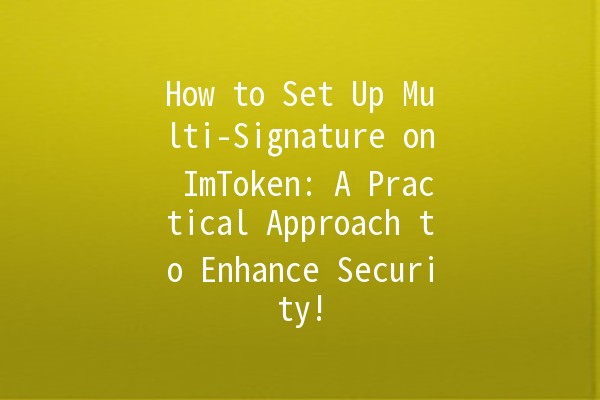When it comes to the world of cryptocurrency, ensuring the safety of your digital assets is paramount. One of the most effective ways to enhance this security is by implementing a multisignature (multisig) wallet system. In this article, we will explore how to set up multisignature on the ImToken wallet, along with several productivity tips to help you make the most of your cryptocurrency management.
Before diving into the setup process, let’s clarify what a multisignature wallet is. A multisig wallet requires multiple private keys to authorize a transaction, which means no single person has full control over the funds. This method significantly reduces the risk of loss due to hacks, theft, or mismanagement.
Enhanced Security: Reduces the impact of a compromised key.
Shared Control: Allows multiple users to manage funds collectively.
Reduced Risk of Mistakes: Requires consensus before spending.

Make sure you have the latest version of ImToken installed on your device. It's available for both Android and iOS platforms.
If you don't have an account yet, follow the steps to create a new wallet. Alternatively, you can import an existing wallet using your recovery phrase.
Select the Type of MultiSig Wallet:
MofN: Choose how many signatures out of the total you want to authorize a transaction.
Add Addresses: Add the public addresses of the participants who will have access to the funds.
Determine the threshold that will be required for signing a transaction. For example, if you set it to 2of3, then at least two out of the three signatures are necessary to authorize a transaction.
After verifying the configuration, confirm the changes. Each participant will need to sign off on the setup for it to be fully functional.
Once your multisignature wallet is set up, conduct a small transaction to ensure that the process works smoothly. Each participant should be able to sign the transaction without issues.
Keep your assets categorized based on their type or purpose. Using tagging or different wallets for various categories can help improve transaction tracking and management.
Set up alerts for significant market changes related to your assets. Many apps, including ImToken, allow you to enable notifications for price movements, enabling you to act quickly.
Regularly back up your private keys and wallet recovery phrases. Store them in a secure location, both digitally and physically, to prevent loss and ensure quick recovery.
Stay informed on market trends and technological advancements within the cryptocurrency space. Online courses and forums can be great resources for continuous learning.
Incorporate analytical tools to assess the performance of your assets. Investment tracking apps can provide insights that guide your trading decisions and help you optimize your portfolio.
If you lose a signing key, it can prevent access to your funds depending on your multisig configuration. Always ensure to have backups of the signing keys stored securely to avoid loss of access.
Most multisig setups allow you to change the required signature setup. However, doing so may require consensus from all existing participants, so it's important to communicate with them.
Transaction fees for multisignature transactions are typically similar to singlesignature transactions. However, note that signing fees or costs may apply when additional validation steps are involved.
Yes, a multisignature setup increases security by distributing control over assets across several keys. This makes it more challenging for a single point of failure to put your funds at risk.
While it is technically possible, multisignature setups are primarily designed for enhanced security purposes. For lowvalue transactions, the complexity and time involved may not be justified.
If a participant refuses to sign and they are key to fulfilling the required signatures, you cannot complete the transaction. Clear agreements on transaction approvals beforehand can help mitigate these situations.
Setting up multisignature on ImToken is an essential step for enhancing your cryptocurrency security. By distributing control over your assets and ensuring a consensus is needed for transactions, you add an extra layer of protection. By following productivity tips, you can further streamline your cryptocurrency management process, enhancing both efficiency and security.
Remember: Continuous learning and careful planning are keys to thriving in the everevolving cryptocurrency landscape!